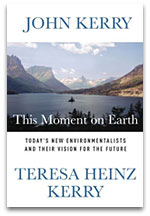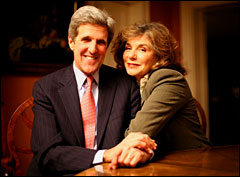The environment brought them together. And now, together, they’ve brought out a book on the environment. (No flip-flop jokes, please.)
John Kerry first met Teresa Heinz at an Earth Day rally in 1990. The two reconnected at the Earth Summit in Rio de Janeiro in 1992, and then, three years later, wed. He continued to focus on the environment as a Democratic senator from Massachusetts, earning the title “Environmental Hero” from the League of Conservation Voters, while she continued her work as chair of the Heinz Family Philanthropies, a major grant maker in the areas of health and the environment.
Now, having survived a failed presidential bid, the political power couple has refocused on the issue that inspires them both. Their new book, This Moment on Earth: Today’s New Environmentalists and Their Vision for the Future, highlights more than a dozen grassroots activists, most of whom they encountered on the campaign trail in 2004. The book is emphatically optimistic about the green movement: “environmentalism isn’t dead,” they write, “it’s just being reborn — the very idea of what it means to be an ‘environmentalist’ is being revolutionized. People from all walks of life, without concern for party or ideological lines, are coming together in unprecedented numbers across the globe.”
Last week they spoke with me from their home in Washington, D.C., about the characters in their book, their 2004 campaign experience, and the role the environment will play in the next presidential election.The duo introduce readers to people like Ellen Parker, a social worker from Cape Cod who battles cancer-linked pollutants, and Helen Reddout, an orchard owner in Washington state who struggles against fecal runoff from nearby dairy farms. Better-known figures like attorney and activist Robert F. Kennedy Jr. and green architect and designer Bill McDonough also make appearances. Throughout, the authors weave in their own experiences with the natural world — from Heinz Kerry’s childhood in the wilds of Mozambique to Sen. Kerry’s environmental advocacy on Capitol Hill.

This Moment on Earth, by John Kerry and Teresa Heinz Kerry.
There are so many topics that you could have covered on the heels of your 2004 election experience. Why did you decide to focus on the environment?
John Kerry: It presents the most important challenges in front of us.
Can you elaborate? There are certainly plenty of politicians and Americans who would argue that the war is the greatest challenge in front of us.
JK: Global climate change is a security issue on a planetary scale. There are millions of lives that may be impacted by it. But it’s not just climate change that presents critical challenges — it’s overfishing, it’s acidity in the oceans, it’s the mercury in our lakes, streams, and rivers that contaminate our fish. What does it say about a country like ours when 40 percent of our rivers, lakes, and streams are too polluted for fishing or swimming? Our water bodies and air quality are challenged beyond any point in our history. It’s a disgrace, and it’s a challenge to all of us to get it right.
Your book is very hopeful. What inspired you to write a hopeful book at a time when the challenges are so vast?
JK: This is not at all a Chicken Little doomsday deal. There are tremendous economic opportunities in addressing these problems, climate change in particular. Here you can improve the environment and public health, but also create jobs and strengthen national security. The potential economic byproducts of addressing this issue are enormous. Not only that, the tipping point is near.
Teresa Heinz Kerry: The 2004 election convinced both of us of the need to connect the dots for people — between the threats, the solutions, and all the concerned citizens who are working to reverse our downward course. We met so many wonderful people while campaigning who were tackling all different kinds of environmental challenges, and creating solutions at a grassroots level. We were very moved by this hopeful surge of activism.
Who were some of the most inspiring activists you met?
JK: The first story that comes to mind is that of Rick Dove, down in North Carolina. He’s a 67-year-old Marine who became a fisherman in retirement with his son. They started developing lesions on their hands and loss of memory, as did other fishermen nearby. Suddenly they see literally tens of thousands of fish floating by over a period of time with sores on them, and they realized that this is all traceable back to the hog farming and the fecal matter that’s being released straight into the river. So they take matters into their own hands — challenging the authorities, enforcing the law, and holding people accountable. It’s a wonderful story of a guy who had every right in the world to retire completely, but who sees a sense of duty, and responsibility, and goes out and does it. That’s patriotism at its best.
THK: There’s another interesting parallel to the Dove story. A few years back in the Chesapeake Bay area [of Maryland], pollution from local chicken farming triggered neurological problems — paralysis and brain dysfunction — among fishermen and boaters, and those affected mounted an impressive response. There are countless examples of people in different ways turning around what was illness, fear, and in some cases despair, into action that is very forceful, very practical, and quite successful.
But probably the most inspirational for me of them all is the one I’ve known the longest, which is Bill McDonough, a philosopher who dares to think beyond any normal constraint. He enlightened me to the connectedness of human health, the strength of our economy, and the well-being of our environment — to the possibility of creating goods and services that simultaneously generate ecological, social, and economic value.
The activists you spotlight embody what you call a “bottom-up” approach to environmental activism. You argue that it’s more effective than a “top-down” approach. How so?
THK: Whenever we’ve had systemic and sustainable change in this country, it’s because the grassroots has been ready to accept it. Top-down activity from the government cannot take root unless there’s bottom-up acceptance. In other words, I don’t think the feds can implement aggressive, massive change unless there’s a readiness at the ground level. I think we’re at that moment right now.
JK: You’re going to have to do both. You can’t deal with global climate change unless there’s a government policy to have carbon priced, to have an economy-wide cap, to create incentives for capital to flow toward solutions. But the pressure to make all that happen is going to come more from the bottom up. That’s what spurred the first environmental movement in the 1970s when we got the Clean Air Act, Clean Water Act, marine mammal protections, and all those other laws. We believe that a similar explosion of grassroots activity is happening today.
It seems to me that the common thread that unites most of the activists you profile is environmental justice, and yet that term only comes up in a few instances in your book. Why did you decide not to use that as a unifying phrase?
JK: Many of the people we spoke with didn’t consider themselves “environmentalists” or part of any particular movement — they just thought they were making a commonsense choice between right and wrong. We’d ask, “Do you consider yourself an environmentalist?” And they’d invariably say, “Not really,” or “No, I don’t,” or “I never think about it.”
Ultimately, we believe, the labels are not important. In fact, the labels can sometimes get in the way — they tend to polarize and isolate. What we want to do is prove that this is inclusive around a bigger set of values and principles that people can all embrace.
There’s an impression among many Americans that you have to be well-off to live an eco-friendly life — to afford organic arugula, a Prius, energy-saving devices, and the like. You both have the resources to build a green home, but what would you say to people who don’t?
JK: It is absolutely true that people with resources have an easier time making these choices. But economies of scale are going to push a lot of these things down in cost, and they’ll become far more accessible. You watch — you’re gonna see Wal-Mart and Costco and a bunch of people selling many green products and energy-saving home retrofits at affordable prices before very long.
Even now, people have choices — you may not necessarily go organic, but you can go local, which tends to be a lot cleaner and cuts down on the energy used to ship the produce from far-off places.
Do you think the environment will play a greater role in the 2008 election than it did in 2004?
JK: Yes. We tried very hard [in 2004]. There wasn’t one state where we didn’t do a major environmental initiative of one kind or another. We did global warming, we did water quality, air quality, we did offshore drilling, wind farms, hog farms, energy independence. You name it, we did the issue. But the press didn’t necessarily pick it up. On the heels of An Inconvenient Truth and the significant public awakening that it has sparked, I think the political climate has changed sufficiently that, indeed, this will probably be more of a cutting issue in 2008.
Do you think that other candidates will, or should, follow John Edwards’ lead in making his campaign carbon-neutral and proposing 80 percent CO2 cuts by 2050?
JK: I think a lot of the candidates have been taking stands on the climate issue. Hillary Clinton supports a carbon cap. [Barack] Obama supports a carbon cap — I think he’s joined on to the bill I introduced in February with [Sen.] Olympia Snowe [R-Maine], that calls for a 65 percent reduction in greenhouse gases below 2000 levels by 2050.
Who do you see as the presidential candidate articulating the strongest environmental agenda?
JK: I’m not going to get into the presidential race right now. I will down the road probably articulate that, but at the moment, I just don’t want to get involved in the ’08 stuff.
Can you tell us about your own personal connection to the environment, how you take steps to lighten your own environmental footprint?
JK: Well, we’ve become much more conscious of it in the last couple of years, although as many as 11 years ago we built our house with a lot of energy efficiency in mind. More recently, we’ve become much more conscious of the carbon imprint, and we buy carbon credits. We’ve also shifted to hybrid vehicles — not all of our cars, but I have a hybrid here in Washington, we have a hybrid in Massachusetts, we have a hybrid at our home in Idaho. We’ve changed almost all of our light bulbs. We’re looking at solar installation and wind installation — localized to home power. And we’re going to continue to move down that road, very aggressively.
THK: I know for me the hardest thing, and the one I’m trying to work the hardest on, that really would impact me, is my flying schedule — how to do the meetings that I have to do via video conferencing, and do less flying. That’s hard for me, but that’s where I’m trying to make improvements.



